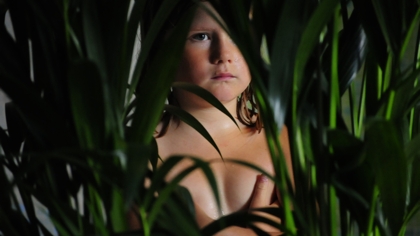Primary navigation


Lisa Aschan’s cryptic fairytale of young womanhood casts its subjects in an uncanny ambience of pale half-light and thick steam. Catherine Wheatley peers quizzically
From our June 2012 issue
Set on the Swedish coast during the long white nights of summer, Lisa Aschan’s eerie, ethereal debut feature She Monkeys is bathed in that pale half-light that makes everything spectral, and set to a soundtrack of sullen bird calls, wind-snatched murmurs and the ever-present rush of the sea. Augmented by a popping, gurgling score from Swedish band Fox Machine, the sonorous rumbling and whispering evokes an atmosphere reminiscent of Lucile Hadzihalilovic’s Innocence (2004). As in that film, something sinister hovers in the air; we brace ourselves for horror, suspense, mystery. What we actually get is weirder, more slippery and somehow more dangerous.
Superficially, She Monkeys sits alongside Innocence, the works of Céline Sciamma, and Catherine Breillat’s A ma soeur! (2001) as a study of girlhood and developing sexuality. Seven-year-old Sara (Isabella Lindquist) is gradually becoming aware of her body’s secret pleasures and potential for shame. In the swimming-pool showers she solemnly surveys the pendulous breasts and wiry pubic thatches of grown women; at home she longs for the romantic affections of her older cousin Sebastian, whom she attempts to please with a small child’s version of a sexy dance routine, tugging pants from her wiggling bum. Her teenage sister Emma (Mathilda Paradeiser) flirts with adult men, but it is the intense, rivalrous friendship with beautiful fellow gymnast Cassandra (Linda Molin) that becomes the testing ground for her burgeoning desires and growing sense of power.
Emma is a plain, silent, watchful girl. With no sign of a mother, and her father almost constantly absent, she has all the freedom of an independent adult but seems to exist in an underwater world, moving slowly, thickly – despite her physical strength – through the film’s viscous atmosphere. We repeatedly see her examining herself in the steamy sea-green bathroom of the family house, but can only wonder at what she sees there. Cassandra – though older, better looking, apparently more confident – is like a looking-glass doppelganger. Consistently clad in matching clothing, with long blonde ponytails swinging behind them, the two are almost, and yet not quite, interchangeable.

While the setting may be contemporary – as sequences in municipal baths and swimwear shops make explicit – the feel here is of a fairytale land. Using a combination of close-ups and medium long shots, Aschan carves out a spooky netherworld in which nothing quite fits together. The girls themselves are frequently framed through multiple doorways and corridors, lending a sense of intangible depth. Uncanny moments abound. At times it seems that either Cassandra or Emma or both may be a variant on the Tallemaja of Swedish folklore – the seductive woodland beauty who lures unwitting admirers to their deaths. All three actresses give extraordinary performances, with the two older girls practically confining their acting to the physical: Paradeiser conjures a world of tightly controlled emotion behind her impressively impassive facade, while Molin moves from malevolence to pity then vulnerability with the slightest curve of her perfect, pillowy lips.
Crafted with deceptive elegance, riddled with gaps, She Monkeys is a disturbing, provocative work. The film climaxes in stolen kisses and furious violence, but at its end we are left uncertain whether Emma, so dreamlike at the best of times, has crafted her own dream version of events. She Monkeys turns out not to be about what happens to these young women, but rather, to borrow a phrase from Longfellow, the “inaccessible solitudes of being, the rushing of the sea-tides of the soul”.
School for scandal: Jonathan Romney on Lucile Hadzihalilovic’s Innocence (October 2005)
Innocence reviewed by Jonathan Romney (November 2004)
Sisters, sex and sitcom: Ginette Vincendeau on A ma soeur! (December 2001)
At the Height of Summer review (September 2001)
Ginger Snaps reviewed by Linda Ruth Williams (June 2001)
The Virgin Suicides reviewed by Mark Olsen (June 2000)